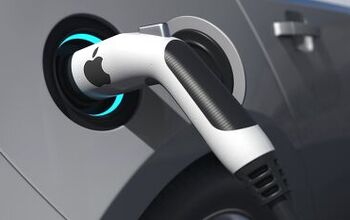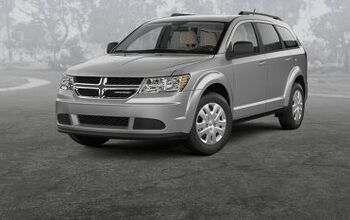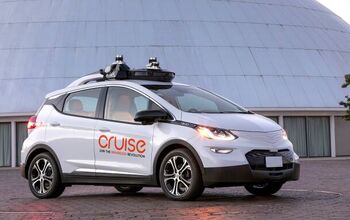Bill Gates and the Self-driving Car
At Microsoft's recent "Global Automotive Summit", someone asked Bill Gates if he thought the auto industry should aim for cars that "wouldn't let themselves crash". To which Mr. Gates replied "absolutely". Bill was, of course, sandbagged. The media love to paint the world's wealthiest man as the world's most powerful control freak– which, of course, he is. But the subtext is always there: Bill Gates is a fascist. In this case, the press got him to "admit" he wants his company to take control of your car.
Again, the insinuation contains an element of truth. For some time now, the automobile industry has been moving towards augmenting/replacing human decision-making with computerized control. Mercedes' Distronic adaptive cruise control is only the most impressive example. The system integrates forward-facing radar with their car's "drive by wire" throttle and brakes, automatically maintaining a safe distance from the vehicle ahead. Rumor has it that the new S-Class will add an emergency braking algorithm, raising electronic intervention to the next level.
Mercedes' braking system will eventually appear in Chrysler vehicles and other mass market products. At the same time, Volvo is unveiling its lane departure warning system. Using sideways-looking radar, the device will guard against driver fatigue and help prevent collisions with vehicles in a driver's "blind spot". From there, it's a slippery slope (without traction control) to computer-controlled steering intervention to automated steering, braking and acceleration. Yes, that's right: a car that drives itself.
It may seem like one of those Popular Mechanics cover stories that never quite pans out, but robots can already negotiate highly challenging physical environments. It's also no secret that the Pentagon is busy developing combat vehicles that can negotiate harsh terrain without any human intervention or oversight, at speed. Within the next twenty years, our relatively safe and featureless highways will accommodate fully automated automobiles. The "set it and forget it" car will follow.
Of course, that's not exactly what Bill endorsed at his press conference. Mr. Gates only agreed that we need cars that wouldn't "let themselves crash". Anyone who's seen a fatal traffic accident up close and personal, or watched a moron drive, would surely agree that effective computerized safety intervention is a laudable goal. I mean, who WOULDN'T want a car that would stop you from crashing?
Enthusiasts. This special interest group can think of nothing worse than a car, truck or SUV that denies them driving's constant, ever-changing challenges– even if the human controlled vehicle is inherently less safe than its robotized equivalent. Wait; there IS a worse nightmare: a self-driving car powered by Microsoft software.
When Mr. Gates unfavorably compared the pace of the auto and computer industry's progress at a COMDEX convention, car enthusiasts launched a withering counter-attack. Their reaction revealed the extent of their antipathy to MSBill. Ironically enough, most of the sarcasm centered on safety issues. For example, "If GM had developed technology like Microsoft, your car would crash twice a day for no reason whatsoever. For some reason you would simply accept this."
It's funny stuff, but irrelevant. The truth is that the majority of people on our roads are not enthusiasts. They do not enjoy driving– at least not in the same sense that pistonheads do. (Hence the large numbers of motorists talking on their cell while driving and the huge take-up rate for satellite radio.) When the Chicago Tribune recently asked readers what features they would like on their car, real or fanciful, nearly 25 percent of the more than 100 respondents named autopilot as the top desire. Most people would gladly sacrifice a large measure of driving pleasure– and autonomy– for extra covenience and safety.
Why wouldn't they? Why shouldn't they? In emergency situations, over 50% of drivers take no evasive action whatsoever. Enthusiasts have been arguing for years for an active, human factors approach to automotive safety: better training, higher driving standards, regular re-testing, selective enforcement, etc. But there is an economic imperative at work. If you raised the standards high enough to prevent serious accidents, you'd probably remove 25% of all drivers from our roads.
The fully computerized car is the ideal way to reconcile driver stupidity with the need to keep our population mobile. And make no mistake: society is up for it. Computerized control has been the de facto standard for the airline industry for many years. Modern planes will not "let themselves crash". They can take-off and land automatically. (In fact they do, all the time.) We accept this development in safety's name, yet commercial airplanes are thousands of times safer than automobiles.
In the US at least, the self-driving car will never be federally mandated. So it's not an either or situation. Enthusiasts should encourage Mr. Gates' in his [unstated] desire to make a self-driving car. It will let them enjoy 'active' driving in a much safer world.
More by Robert Farago
Latest Car Reviews
Read moreLatest Product Reviews
Read moreRecent Comments
- Lorenzo The unspoken killer is that batteries can't be repaired after a fender-bender and the cars are totaled by insurance companies. Very quickly, insurance premiums will be bigger than the the monthly payment, killing all sales. People will be snapping up all the clunkers Tim Healey can find.
- Lorenzo Massachusetts - with the start/finish line at the tip of Cape Cod.
- RHD Welcome to TTAH/K, also known as TTAUC (The truth about used cars). There is a hell of a lot of interesting auto news that does not make it to this website.
- Jkross22 EV makers are hosed. How much bigger is the EV market right now than it already is? Tesla is holding all the cards... existing customer base, no dealers to contend with, largest EV fleet and the only one with a reliable (although more crowded) charging network when you're on the road. They're also the most agile with pricing. I have no idea what BMW, Audi, H/K and Merc are thinking and their sales reflect that. Tesla isn't for me, but I see the appeal. They are the EV for people who really just want a Tesla, which is most EV customers. Rivian and Polestar and Lucid are all in trouble. They'll likely have to be acquired to survive. They probably know it too.
- Lorenzo The Renaissance Center was spearheaded by Henry Ford II to revitalize the Detroit waterfront. The round towers were a huge mistake, with inefficient floorplans. The space is largely unusable, and rental agents were having trouble renting it out.GM didn't know that, or do research, when they bought it. They just wanted to steal thunder from Ford by making it their new headquarters. Since they now own it, GM will need to tear down the "silver silos" as un-rentable, and take a financial bath.Somewhere, the ghost of Alfred P. Sloan is weeping.





































Comments
Join the conversation
I won't hold my breath for this to come to pass.